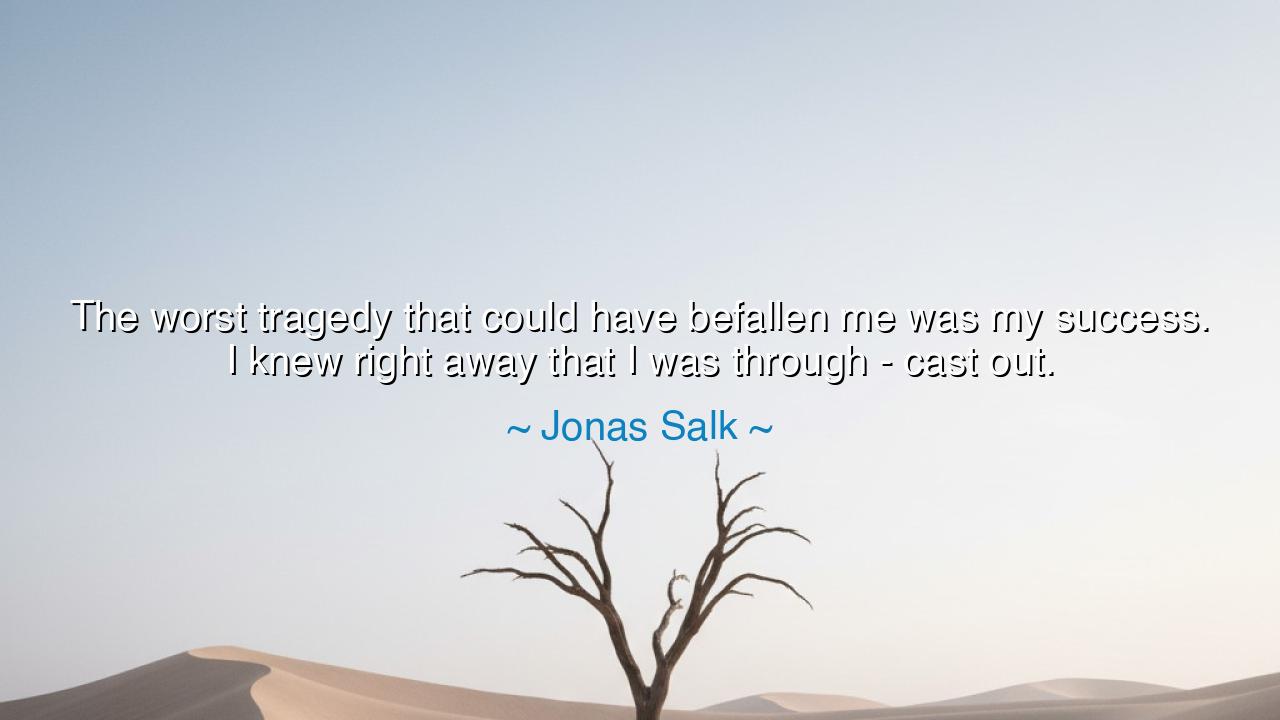
The worst tragedy that could have befallen me was my success. I
The worst tragedy that could have befallen me was my success. I knew right away that I was through - cast out.






Hear the haunting words of Jonas Salk, the healer who gave the world the vaccine against polio, who declared: “The worst tragedy that could have befallen me was my success. I knew right away that I was through—cast out.” These words strike like a paradox, for we are taught to believe that success is the summit of all striving, the crown upon the victor’s head. Yet Salk, who saved millions of lives, confessed that his moment of triumph was also his exile, for with victory came the silence of purpose fulfilled, and the weight of being no longer needed.
The ancients knew this truth, though they clothed it in the language of myth. Consider the tale of Achilles, who won glory on the battlefield but found in that glory a death sentence. His success fulfilled his destiny, but it also brought him to an end. So too did Salk feel the double-edged sword: his discovery was hailed as a miracle, yet in that moment, the journey of discovery—the fire that had driven him—was extinguished. The world celebrated him, but in the celebration, he felt cast aside, for there was no longer a mountain to climb.
In Salk’s lament, there lies a warning about the nature of success. When we achieve our greatest dream, we may also face the emptiness of completion. The chase, the struggle, the problem to be solved—these are what give life its vigor. To reach the end of the quest is to taste both triumph and despair. For without a new challenge, even the victor feels cast out, as Salk confessed, no longer belonging to the realm of striving that had given his days meaning.
History offers us the example of Alexander the Great, who conquered the known world before his thirtieth year. At the height of his triumph, he wept, saying there were no more worlds to conquer. His success, absolute and unmatched, became his tragedy, for it robbed him of purpose. Like Salk, Alexander stood on the summit only to find himself staring into emptiness. Thus, the greatest danger of achievement is not failure, but the loss of reason to keep climbing.
Yet this is not a counsel of despair, but of renewal. For Salk’s lament points us to the truth that life must not be measured by one peak, but by many. The tragedy he named can be transformed into wisdom: that when one success is reached, the soul must not rest forever in it, but must set its gaze upon new ideals, new mountains, new causes. To remain with yesterday’s glory is to wither; to seek tomorrow’s challenge is to live.
The lesson is clear: do not let your greatest success become your prison. Celebrate it, honor it, but do not let it be the end. Always prepare your heart for renewal, for another vision to pursue once the first is achieved. The tragedy Salk described can be avoided by cultivating within oneself an unending hunger for purpose, an unquenchable thirst for discovery. Success is not the end of the journey, but the beginning of the next.
Practical wisdom follows: when you achieve a long-sought goal, do not fall into idleness or despair. Instead, ask: What greater good remains undone? What new calling can I serve? Allow each triumph to be a stepping stone, not a final resting place. Like the farmer who, after harvest, prepares the soil anew, so must the human soul continue its labor, lest it wither in the empty fields of old glory.
So let the words of Jonas Salk endure: “The worst tragedy that could have befallen me was my success.” Children of tomorrow, take this teaching to heart. Let not your triumphs cast you out into silence. Let them be torches that ignite the path to new purposes. For true greatness is not found in one victory, but in the eternal striving, the endless renewal of vision, until the final breath itself becomes the last offering to the work of life.






AAdministratorAdministrator
Welcome, honored guests. Please leave a comment, we will respond soon